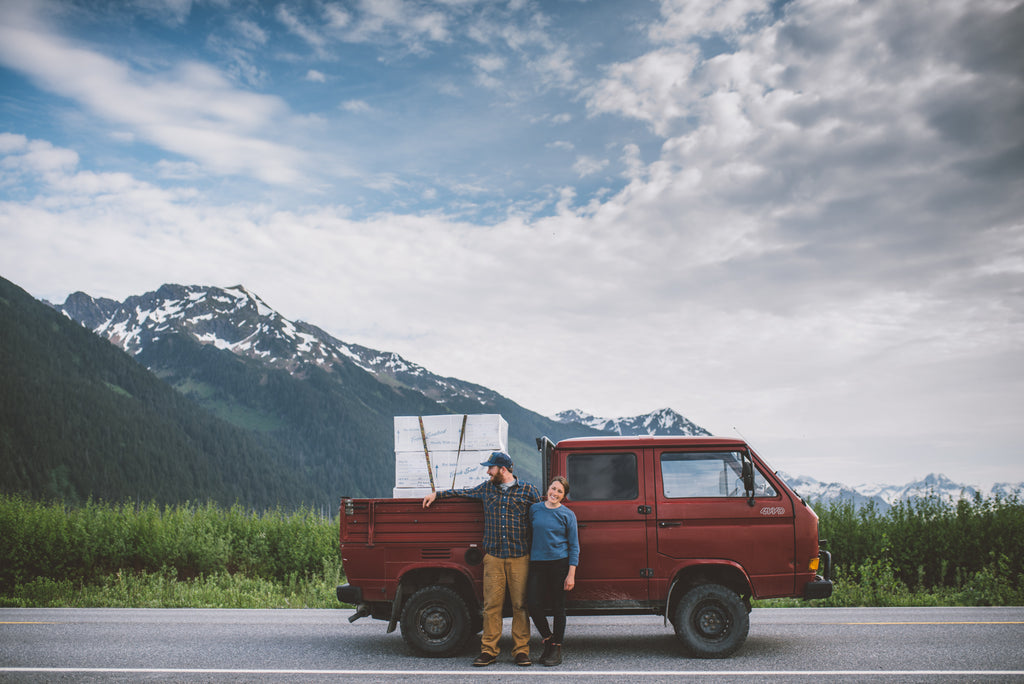Edible Seattle / January 2019
Story by Kelly Knickerbocker
Raindrops slide down the edges of a dozen pop-up tents assembled outside of Peace Vans, a full-service shop for vintage vans and buses, in Seattle’s SoDo neighborhood. It’s early autumn, and a light breeze works its way through bundled attendees. Hands are shoved into pockets when not reaching for beers and freshly-shucked oysters. A sense of excitement permeates, despite the inclement Pacific Northwest conditions.
Nelly and Michael Hand, owners of the Cordova, Alaska-based Drifters Fish, are throwing a party.
Once a year, the couple loads up their vintage Volkswagen Vanagon DOKA and heads south to the Emerald City to distribute their haul: fresh, sustainably caught Copper River salmon. In addition to operating and maintaining their fishing vessel; harvesting salmon May through September; supplying acclaimed Seattle restaurants with wild, hand-processed fish; and smoking, canning, and distributing their line of shelf-stable products, the Hands also run a Community Supported Fishery (CSF).
Like Community Supported Agriculture (CSA) programs that bring farm-direct produce to doorsteps across the region, members buy into the Drifters Fish CSF. Their prepaid deposits allow the husband-and-wife team to ready their boat — a 31-foot gillnetter named The Pelican — as well as buy and repair fishing gear, stock up on fuel, and clean, package, and ship salmon throughout open season.

This means the Hands don’t start their fishing season at a deficit — all the pre-season work is financed by CSF subscribers. And the sales of their canned product sales help sustain them through the winter off season. “With the CSF and our shelf-stable products, we’ve extended our season,” says Nelly. “We’ve created a new type of job for ourselves that keeps us working for more of the year. Drifter’s gives us stability.”
Life revolves around fishing in Cordova, home to just north of 2,000 people. At the start of each fishing season, the town rumbles to life with boat engines and families — couples, parents and their kids, and teams of siblings take to the waters that their livelihoods depend on. The 50-mile-wide Copper River Delta, where the river empties into the Gulf of Alaska, boasts a prolific salmon run.
“Salmon go out into the ocean to eat and back to the river to spawn,” says Nelly, “and we’re catching them in the transition between the two — when they’re fat and strong and ready to move through those bodies of water.”
That’s where the party comes in.
Gathered under tents on a soggy October afternoon, CSF supporters are all smiles because they’re receiving their share of the bounty. The Hands’ handiwork is ready to distribute.
Unique to Drifters Fish is the business structure: Nelly and Michael own every step of the supply chain, rather than selling their catch to a cannery or a third-party distributor. Each CSF member gets a box of prepackaged, portioned, flash-frozen salmon that the Hands have maintained at every step — from Alaska’s coastal waters to this end-of-season celebration in Seattle.
After nibbling from passed plates — grilled Copper River coho salmon with fresh herbs and foraged chanterelles — and browsing other makers’ and artisans’ wares, CSF members leave with a box of fish hoisted up on their shoulders — five, ten, or twenty pounds worth.
The Drifters Fish difference isn’t touted by CSF members alone. During the season, the Nelly and Michael harvest salmon, run back to town, have the fish packaged immediately, and drive it straight to the airport. Fresh fish arrives at some of Seattle’s best-known restaurants, including Canlis, Marine Hardware, Staple & Fancy, and The Walrus and the Carpenter, often within 24 hours after being pulled aboard The Pelican.

Growing up, Nelly and Michael worked on their families’ boats in Cordova, which were docked at the same harbor season after season. Nelly and Michael now dock The Pelican at that same harbor, alongside Nelly’s brother, who took over the family boat when their dad retired, and Michael’s brother, who runs a boat, too.
Depending on the conditions, days spent on The Pelican can range from defeating to back-breaking to awe-inspiring. Because fishery managers carefully monitor the Copper River to maintain ecosystem health and long-term sustainability, fishing time is determined day by day — from zero to 12 hours.
“I don’t want to catch the last fish in the ocean,” says Nelly. “Fishing is my job, but I’m a huge advocate for healthy watersheds. When our fishing times are limited, I’m behind that. I hope it means in the future that more fish come back.”
Even when they get the green light to fish, cyclical ebbs and flows are part of the gig. Last season’s low point was when The Pelican’s main hydraulic pump broke down. “It operates everything on deck, including the reel that pulls our net in,” Nelly says. “We couldn’t pack up for the day — the fish are too valuable. So we stayed and hand-rolled the net. It was exhausting, but we did it until fishing closed for the day.” Weeks later, Nelly and Michael were treated to a unique perk of the job: stunning views of the Northern Lights. “They stretched from horizon to horizon; the biggest I’ve ever seen.”
Nelly and Michael’s day-to-day responsibilities take different shapes throughout the year, too. “Our season in Alaska is intense,” says Nelly. “We’re working every hour of the day, every day of the week. We’re so focused while we’re there to harvest. Bringing your adrenaline down after that is challenging, so I appreciate the chance to slow down when it’s over.”
Back in the lower 48, off-season means Drifters Fish shifts from harvesting and shipping to distributing CSF shares from Seattle to Bellingham to Carnation, Washington. Moving further into winter, they distribute smoked salmon to wholesale partners and work the holiday market circuit. Nelly also spends time walking into restaurants. “I introduce myself, say, ‘I’m a fisherman, our salmon is sustainable and fresh, and I caught it.’”
← Back to Stories